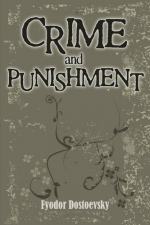|
|
Crime and Punishment Objects/Places
garret (Raskolnikov's room): The tiny rented room where Raskolnikov spends most of his time in thought, he receives room and board from his landlady, to whom he is heavily in debt. Raskolnikov sometimes expresses his contempt for the dingy, cursed room.
St. Petersburg: The setting of the novel, St. Petersburg is a cosmopolitan city that is a spiritual and intellectual hotbed of various peoples and ideas.
Hay Market: A section of the city with an array of markets, taverns, and lowly establishments, it is considered to be the slums of St. Petersburg, where the working and lower classes congregate.
green shawl: A big shawl made of drap de dames, it is the Marmelodov's family shawl. It becomes an object associated with suffering. Sonia puts it on when she comes back from sacrificing herself for the first time. Katerina Ivanovna puts it on before going out to find justice when her family is evicted from their home. She has it on when she and the children beg on the streets. When she dies, the green shawl is passed on to Sonia.
yellow ticket: A passport that identifies a person as a prostitute, it is Sonia's mark of shame. She is publicly censured and forced out of her family's residence because of it.
(mother's) letter: A letter from Raskolnikov's mother, it relays several details: that both mother and sister consider Raskolnikov to be their hope, that his sister faced troubles and sufferings at the hands of her employer, but is engaged to a rich, practical businessman, and that they are going to visit him soon. Raskolnikov is greatly affected by the letter.
horse (in dream): Raskolnikov has a dream where he is a young boy walking through town with his father. As they pass a tavern, a bunch of drunkards beat and kill a horse. The young boy runs to the horse and kisses the bloody horse's lips and eyes. Raskolnikov wakes up and realizes that he is dreaming about killing the old pawnbroker.
Neva: The river where Raskolnikov passes by several times in the story; it is the place where he symbolically throws the money he received from the elderly lady. Raskolnikov also considers throwing himself into the river, but cannot find the courage.
On Crime (essay): An article that Raskolnikov submits for publication, it is published without his knowledge. Porfiry chances upon it and finds it to be the source of Raskolnikov's motivation in murdering the old woman. The article details Raskolnikov's theory that the extraordinary man has a right to overstep certain boundaries in order to benefit mankind.
Lazarus: The young man whom Jesus raises from the dead in the Gospel of John, Lazarus comes to represent the resurrected soul. Raskolnikov makes Sonia read him the story of Lazarus from the New Testament. In the end, Raskolnikov experiences a similar 'resurrection from the dead.'
Napoleon: The legendary world conqueror who founded an empire, Napoleon is considered by Raskolnikov to be one of the extraordinary men in history who was able to overstep whatever obstacles that got in the way of his goals. Raskolnikov reasons that Although Napoleon shed much blood, he is considered a hero because he rose above the masses-in both action and conscience. Raskolnikov is disappointed to discover that he is not a Napoleon.
Schiller: A popular German poet, Schiller is the embodiment of an idealist. Porfiry accuses Raskolnikov several times of being a Schiller.




